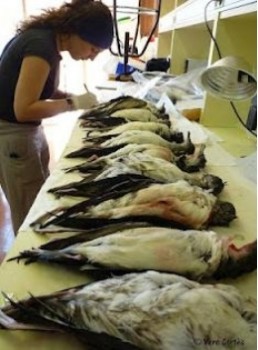Verónica Cortés (Departament de Biologia Evolutiva, Universitat de Barcelona, Spain) and colleagues have published in the journal Marine Ecology Progress Series on bycatch mortality of Scopoli’s Calonectris diomedea, Balearic Puffinus mauretanicus and Yelkouan P. yelkouan Shearwaters in the north-western Mediterranean Sea.
“Bycatch mortality in longline fisheries is considered the main threat at sea for numerous seabird species. These incidental catches occur worldwide, but mortality levels are mainly determined by the specific traits of the fishery operating in each area and the feeding behaviour and local abundance of seabirds. In the Mediterranean, demersal artisanal longliners are known to catch several seabirds, but bycatch rates and the main factors influencing both the probability and the level of seabird bycatch are poorly known. From 2011 to 2015 we conducted 220 trips onboard demersal longline vessels of the Balearic Sea, aiming to study their interaction with seabirds, as well as to understand the detailed procedures of the fishery and the factors that might influence seabird bycatch. Additionally, we recorded bird catches reported by fishermen. We found an average overall bycatch rate of 0.58 birds per 1000 hooks (0.13−1.37, 95% CI), which would imply a conservative estimate ranging from 274 to 2198 seabirds caught annually on demersal longliners in the study area. The most affected species were the 3 endemic and threatened Scopoli’s, Balearic and Mediterranean shearwaters of the Mediterranean (Calonectris diomedea, Puffinus mauretanicus and P. yelkouan, respectively), likely due to their highly aggregative behaviour and diving capabilities. Overall, the main factors influencing bycatch risk were season and time of day. Other influential factors were bait type, wind conditions, gear configuration (specifically, distance between weights), proximity to the breeding colony and the number of hooks. This study shows that mortality caused by demersal longliners is high and may be jeopardizing the viability of the shear water populations. Therefore, the identification and implementation of mitigation measures is urgently required.”

Balearic Shearwaters killed by a longliner, photograph by Verónica Cortés
Reference:
Cortés, V., Arcos, J.M., & González-Solís, J. 2017. Seabirds and demersal longliners in the northwestern Mediterranean: factors driving their interactions and bycatch rates. Marine Ecology Progress Series 565: 1-16.
John Cooper, ACAP Information Officer, 23 February 2017

 English
English  Français
Français  Español
Español